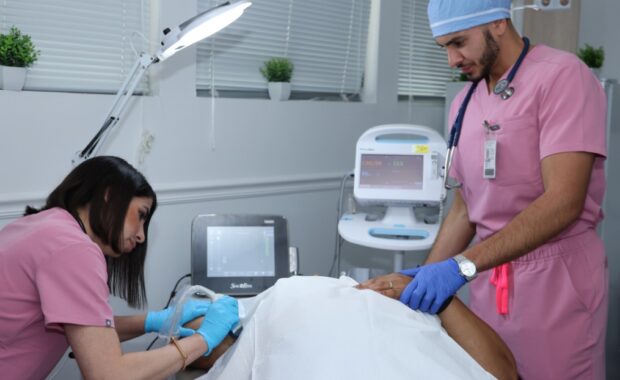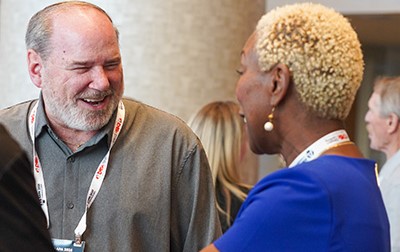PAs Aim to Close the Care Gap in Rural Areas of Tennessee
PA Marie Patterson and PA student Molly Valentine advocate for more PAs in rural medicine
March 27, 2024
By Dave Andrews
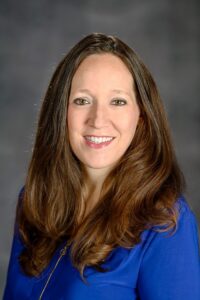
Coming out of PA school, Marie Patterson, DHSc, PA-C, was considering multiple job offers in a variety of settings. After careful deliberation, the job she ultimately took wasn’t the one that offered the most convenience or the highest salary.
For Patterson, she wanted a position that presented the best opportunity to make the biggest impact. So, she accepted an offer to work in the emergency department at Harden Medical Center in the small town of Savannah, Tennessee.
“For me, it was kind of a leap of faith to go right into rural emergency medicine. But I’m so glad I did because I was able to see and do so much in that setting that I probably wouldn’t have been able to do elsewhere,” said Patterson, who at the time, was the first and only PA to work at that hospital.
Patterson looks back fondly at the experiences she had in her first role. In a relatively short period of time, she says the knowledge she gained from seeing patients with so many diverse backgrounds and unique needs was invaluable to her career.
Taking Action in High-Need Areas
More than 20 years later, Patterson is still focused on filling the gap in access to care in rural areas—but these days, it’s by educating and inspiring the next generation of PAs.
Since helping to establish the PA s program at Middle Tennessee State University (MTSU) in 2020, Patterson has continued to serve full time as the program’s director. And one of the program’s key missions is to introduce students to the many career opportunities in rural medicine.
“We care about all patients, of course, no matter where they come from or what their backgrounds are,” Patterson said. “But increasing access to care is especially critical in so many rural areas of Tennessee and all across the country. As [MTSU’s] internal benchmark, we want 100% of our students to have at least one clinical opportunity in one of those high-need areas.”
Patterson says research has shown that for a large portion of PAs, their first job is in an area they were exposed to during their clinical rotations. Her hope is that by being intentional in exposing students to rural medicine early on, they will “realize how much of a difference they are making and that they’ll fall in love” with the area.
“We encourage the students to keep an open mind throughout their clinical rotations, and a lot of them already have a strong willingness to take on any role,” Patterson said. “So much of [the responsibility] falls back on the PA programs to find ways to put them in areas that need providers the most.”
Dream Job
For some PA students, the idea of working in rural medicine may seem somewhat daunting. For others, like Molly Valentine, it would be a dream come true.
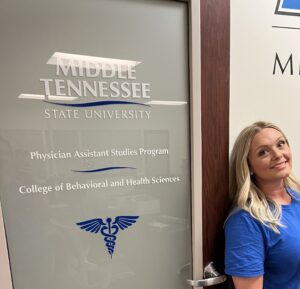
Valentine, who will graduate this year from the PA program at MTSU, grew up in a small town in Delaware and feels a strong connection to patient populations in rural areas. She has continually voiced her preference for doing her rotations in rural settings, and of the six rotations she has completed or planned thus far, four were in rural areas.
“When you work in rural medicine there are going to be some unique challenges and opportunities that providers might not experience in other settings,” Valentine said. “You help them work through their problems in a way that’s different because many of them face a variety of barriers to healthcare—and not just access to care, but maybe financial, emotional, or physical barriers as well.”
Recently, Valentine was in the clinic seeing one of her patients who was pregnant with her first child. The patient had several underlying health conditions that were exacerbated by the pregnancy, and Valentine knew the treatment plan would be a multi-phase process requiring a delicate balance of patience and support.
“You can’t just throw all of these [treatments and lifestyle changes] at them at once—that can easily make it a negative and overwhelming experience, especially when the patient has to deal with multiple barriers to care,” Valentine said. “Instead, we determined which disease processes needed to be worked through first, and we told the patient we would work through it together, taking it one chunk at a time.”
Valentine is currently doing a rotation in a women’s health clinic in a rural area of Tennessee and hopes to return on a full-time basis after she graduates. Having helped numerous women through a wide range of issues, Valentine says there is “never a dull moment” and that she relishes the opportunity to be an advocate for each of her patients.
“There are countless people all across the country who don’t have a primary care physician, a PA, or a nurse practitioner in their town, so how are they ever going to figure out how to effectively navigate getting access to specialty care?” Valentine said. “There has to be someone who is willing to stand up for the patient when their needs are specific.
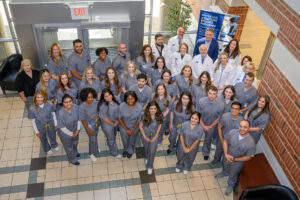
“That’s one of the biggest reasons I love rural medicine—you not only get to care for the patient, you advocate for them, too.”
Intangible Benefits of Rural Medicine
Patterson acknowledges that salary potential is a significant factor for many PAs as they consider employment options. This can be especially true for recent graduates who have considerable student loans to pay off.
But both Patterson and Valentine agree that although the pay in many of the high-need, rural areas often isn’t as much as in more populous locations, the intangible benefits more than make up for the difference.
“Career decisions are so often financially motivated, but I would say try not to make a decision based solely on that because being happy somewhere—waking up each day and loving your job—can make a huge difference,” Patterson said. “That altruistic feeling that many providers seek can be achieved when they can actually see the difference they’re making in someone’s life.”
During her rotations, Valentine has already gotten a small taste of those benefits. And it’s her hope that more of her fellow PAs give rural medicine serious consideration.
“I have yet to leave work in a bad mood, and it’s hard for me to imagine ever getting burnt out when I can see I’m making an immediate impact,” Valentine said.
“When you know that many of these people would not otherwise have access to care and you’re the primary reason why their health has improved… I don’t know how else to describe it—it’s just magical.”
You May Also Like
PA and Medical Students Serve the Unsheltered Population through the HOME Street Medicine Program
PAs Anderson and Kent Make Career Pivots to Address Care Gaps in Rural Areas
Carl Frizell Advocates for Justice, Equity, Diversity, Inclusion
Thank you for reading AAPA’s News Central
You have 2 articles left this month. Create a free account to read more stories, or become a member for more access to exclusive benefits! Already have an account? Log in.

